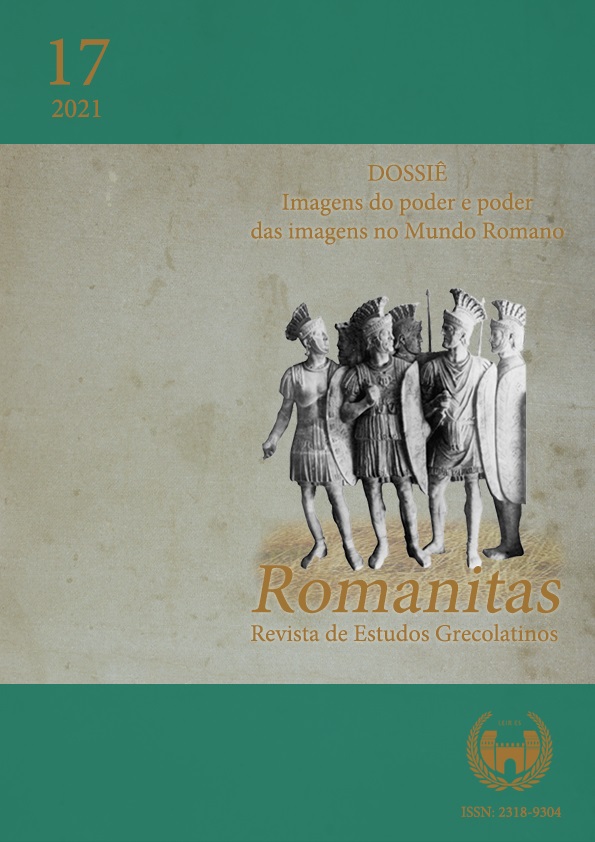Teodoro Estudita e sua oposição ao poder imperial: uma análise da Controvérsia Moechiana e da Segunda Iconoclastia
DOI:
https://doi.org/10.17648/rom.v0i17.35352Parole chiave:
Teodoro Estudita, Controvérsia Moechiana, Iconoclastia, Poder Imperial, BizâncioAbstract
Teodoro Estudita foi um monge que, no decorrer do século IX, foi uma importante força de oposição diante das decisões imperiais julgadas por ele como ultrajantes aos ideais cristãos bizantinos. Em duas ocasiões, colocou-se contrário ao imperador e suas ações, sofrendo consequências e punições, como o exílio. Em função disso, nosso objetivo se insere na tentativa de compreender o papel de Teodoro como agente de oposição ao palácio imperial e suas relações com ele, uma vez que os monges eram considerados importantes meios de contato e influência sobre a sociedade bizantina. Pretendemos fazer isso a partir do estudo de caso da Controvérsia Moechiana e da Segunda Iconoclastia (815-843), nas quais o monge foi protagonista.
Downloads
Riferimenti bibliografici
Documentação textual
GRUMEL, V. Le patriarcat byzantine, série I: les regestes des actes du patriarcat de Constantinople. Les actes patriarches, fasc. II et III. Les regestes de 715 à 1206. Paris: Institut Français d’Études Byzantines, 1989. v. 1.
TESTAMENT of Theodore the Studite for the Monastery of St. John Stoudios in Constantinople. In: THOMAS, J.; HERO, A. C. (ed.). Byzantine monastic foundation documents: a complete translation of the Surviving Founder’s Typika and Testaments. Washington: Dumbarton Oaks, 2000, p. 67-83.
Obras de apoio
ALEXANDER, P. J. Religious persecution and resistance in the Byzantine Empire of the eighth and ninth centuries: methods and justifications. Speculum, v. 52, n. 2, p. 238-264, 1977.
BENOIT-MEGGENIS, R. L’empereur et le moine: recherches sur les relations entre le pouvoir impérial et les monastères à Byzance, du IXe siècle à 1204. 2010. Tese (Doutorado em História) – École Doctorale en Sciences sociales, Université Lumière Lyon 2, Lyon, 2010.
CHARANIS, P. The monastic properties and the state in the Byzantine Empire. Dumbarton Oaks Papers, v. 4, p. 53-118, 1948.
CHOLIJ, R. Theodore the stoudite: the ordering of holiness. Oxford: Oxford Scholarship Online, 2009.
KAZHDAN, A. P. (ed.). The Oxford Dictionary of Byzantium. Oxford: Oxford University Press, 1991. v. 3.
McGUCKIN, J. The theology of images and the legitimation of power in eighth century Byzantium. St Vladimir’s Theological Quarterly, p. 39-58, 1993.
MEYENDORFF, J. Byzantine theology: historical trends and doctrinal themes. New York: Fordham University Press, 1979.
MILLER, T. Theodore Studites: Testament of Theodore the Studite for the Monastery of St. John Stoudios in Constantinople. In: THOMAS, J.; HERO, A. C. (ed.). Byzantine monastic foundation documents: a complete translation of the Surviving Founder’s Typika and Testaments. Washington: Dumbarton Oaks Research Library and Collection, 2000, p. 67-83.
MORRIS, R. Monks and laymen in Byzantium, 843-1118. Cambridge: Cambridge University Press, 1995.
OSTROGORSKY, G. Historia del Estado bizantino. Madrid: Akal, 1984.
STAMBOLOV, A. Monks and state: St Theodore the Studite and his relations to the State and Church authorities in Byzantium. Phronema, v. 30, n. 1, p. 137-165, 2005.
TREADGOLD, W. Breve historia de Bizancio. Barcelona: Paidós Ibérica, 2001.
Downloads
Pubblicato
Come citare
Fascicolo
Sezione
Licenza
Copyright (c) 2021 Caroline Coelho Fernandes

Questo lavoro è fornito con la licenza Creative Commons Attribuzione - Non commerciale - Non opere derivate 4.0 Internazionale.
a. Gli autori mantengono i loro diritti sugli articoli e concedono alla rivista il diritto di prima pubblicazione.
b. Gli autori sono autorizzati a fare accordi complementari per distribuzione non esclusiva della versione del testo uscito nella rivista, e a pubblicare l’articolo in un deposito istituzionale oppure in un libro, sotto forma di capitolo, a patto che sia menzionata la prima pubblicazione in questo periodico.
c. Gli autori sono autorizzati e stimolati a pubblicare e diffondere i loro articoli online, in sito elettronico proprio o in qualsiasi altro, dopo la prima pubblicazione nella rivista, e sempre facendo riferimento a Romanitas.
d. Gli articoli della rivista hanno una licenza CC BY 4.0 Deed Attribuzione 4.0 Internazionale (CC BY).




























